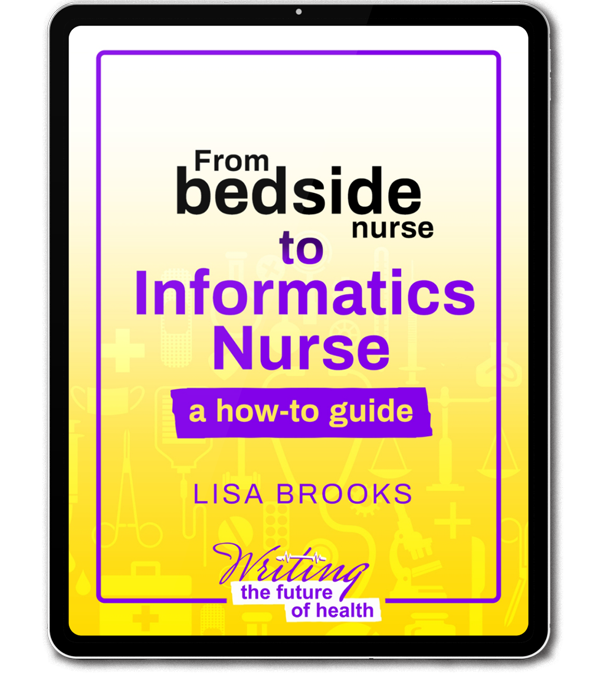The other morning I got a text from my husband. He sent a news headline along with the note, Help them. It was from the Washington Post and read: “Burned out by the pandemic, 3 in 10 healthcare workers consider leaving the profession.” I wish I was surprised, but unfortunately I was not. My social media feeds have been filling up with nurses explaining why they are quitting Nursing. My husband sent this to me because he knows I think Nursing Informatics offers an answer for nurse burnout.

Nurse burnout was already a problem that got even worse last year
I was inspired to become a nurse because of the Johnson & Johnson campaigns in the early 2000s. They brought attention to how the nursing shortage was expected to get even worse as Baby Boomers approached retirement age. That campaign was effective in bringing more nurses like me into the profession. One article reports these efforts added over 1 million new nurses.
However, that has not solved staffing problems. In an effort to save money, many hospitals rely on per diem and travel nurses to supply ‘just in time’ staffing. This is an approach used in manufacturing where parts are ordered ‘just in time’ so there is no oversupply. It saves money because the manufacturer (or hospital) is not paying for supply (or staff) that is not being used.

However, this cost-saving approach became a huge liability during the pandemic. Demand for travel and per diem nurses skyrocketed, and hospitals had to compete with each other for resources. Many hospitals paid travel nurses double what they paid their staff nurses.
As hospitals competed for nursing talent, there were also many nurses who left their jobs either temporarily or permanently. Some nurses took a leave of absence to care for children who were suddenly home full-time. Others planned to retire anyway and took the pandemic as a sign it was time. One estimate reports as many as 1 million nurses may retire by 2030.
Whether they left their jobs or not, there are still many nurses feeling burned out right now.

Burnout takes a toll on nurses
The pandemic highlighted the many causes of nurse burnout. A few of these include:
- The danger of the virus itself
- Feeling expendable due to lack of support
- Feeling betrayed by a public that thanks frontline workers while refusing to cooperate with measures to slow the pandemic
- Seeing the gaps in a profit-driven healthcare system
But to expect nurses will just ‘get over it’ underplays how serious burnout really is. Burnout increases risks to patients because nurses are not paying as much attention to detail as we should. It also increases the risks of PTSD, anxiety, depression, substance abuse, and suicide. There is not yet a strong infrastructure to support mental health of healthcare workers like there is for soldiers returning from war.
Healthcare also still lives with a stigma about not ‘toughing it out.’ Whether ‘toughing it out’ means staying in a job you hate, not seeking therapy, or not even acknowledging what you have been through, it is unhealthy.

Unfortunately, many nurses feel stuck in this profession. For some it is because of financial obligations, like student loans to attend nursing school. They need their nursing salary plus overtime. For others, being a nurse is such a big part of their identity it is hard to imagine anything else. Nursing comes with a level of respect not seen in many other professions.
This is where I feel strongly that Nursing Informatics has a lot to offer nurses.

What Nursing Informatics has to offer
If you are not familiar with what Nursing Informatics is, you can think of it as a combination of Nursing, Computers, and Data. Informatics Nurses work as the link between clinical and technical. We help to design computer systems that support nurses and other healthcare workers.
I recommend any nurse who feels stuck or is looking for options to consider this field. Here are the main reasons why:
Reason #1: Work from anywhere
I hear from nurses all the time who wish they could work from home. There are nurses jealous of those who comfortably worked from their living room couches this past year. There were also many nurses who struggled to balance their kids’ distance learning while they had to leave for a shift.
Nursing Informatics is one of the few nursing fields where you can work from home. Or anywhere really. I know people who took advantage of the extended visas offered by Caribbean islands to attract remote workers. Nurses do not usually get the opportunity to be remote workers. Those who want to travel and work have to look for travel nurse assignments.

But Informatics Nurses can work wherever we have a laptop and wifi connection. Whether you want to work from home so you get more time with family, or live the laptop lifestyle and travel full-time, Nursing Informatics supports a work-from-anywhere career.

Reason #2: You are still a nurse and will use your nursing skills
I am fascinated by YouTubers who quit Nursing to work in an eyelash salon. It probably pays decently, and if you love eyelashes then…hey…do your thing.
But I also think about all the blood, sweat, tears, and, oh yeah, money that went into becoming a nurse. I wonder if those nurses ever reconsider, or wish they tried something else in Nursing. Perhaps some day they will miss the respect that comes with this profession.
So, I am ringing the bell loud and clear: NURSING INFORMATICS IS NURSING! You do not have to give up this profession to take a break from the bedside. Informatics Nurses have to use our nursing skills, clinical experience, and professional judgement. We work with nurses in clinical roles to understand what they want and need, and explain those wants and needs to technical people.

It is a very valuable skill set, and one that is learnable. In fact, I think many nurses have the ability to be great Informatics Nurses if they knew this was an option.

Reason #3: Opportunity to make systems better for other nurses
If you ever wanted to do something about nurse burnout, this is your chance. One of the most satisfying parts of this career is building tools and systems other nurses can use to be more effective.
In fact, one of my favorite memories in my career is reducing an assessment for hospice nurses from 80 questions over several tabs, to 10 questions in one tab. I know that sounds so simple and not exactly glamorous. But I literally got hugs.

Reason #4: Grow your business skills
Informatics Nurses are frequently part of major decisions by healthcare organizations. Healthcare leaders turn to us for input and feedback during strategic planning, operational issues, and quality improvement. Our voices matter because we hold the keys to both clinical and technical – two core parts of any healthcare organization.

Because we sit in this strategic position, we get to see the bigger picture. I used to get so frustrated with ‘upper management’ and decisions that seemed incomprehensible. Once I became an Informatics Nurse, I was invited into the room where the decisions were made. I got to see the regulatory pressures, financial problems, opportunities for the future.
With that kind of exposure, your business skills grow quickly. Whether you want to stay in an Informatics role long-term, or just try it for a year, those are skills you can take anywhere.

Reason #5: It pays well…really well…
I bring up pay towards the end because I do not want it to be the only reason to consider Nursing Informatics. But it is a field with a lot of high salaries. According a 2020 survey by HIMSS – the largest health technology professional organization – 49% of their members who are Informatics Nurses make over $100,000. Ziprecruiter lists the national average salary at $102,230 per year.
Informatics Nurses may also be eligible for annual performance bonuses. These are often a percentage of their salary, such as 10-30%. Informatics Nurses who work for software companies may also get stock options, sales bonuses, and other types of compensation. In the software world, it is not uncommon to earn equity (ownership) in the company that is vested over some number of years. That means the longer you stay the more you can walk away with over time.
Salary negotiation is normal in the technology world, and that applies to Nursing Informatics as well. Usually you negotiate base salary, bonuses, and any other types of compensation as a complete package. This is why websites that report average salaries can be so inaccurate for Nursing Informatics – it is hard to know what compensation package an Informatics Nurse negotiated.

Reason #6: (Big Secret) You do not need a master’s degree to become an Informatics Nurse
This is not meant to knock master’s degrees for nurses – there are many other benefits to a graduate level education. However, a master’s degree is not required to become an Informatics Nurse. You can get into this field by getting some experience even in your current nursing role.
I wrote an entire guide on how to get into Nursing Informatics without graduate school, which you can purchase in my online store.
From Bedside Nurse to Informatics Nurse: A How-To Guide walks you through the basic topics you will need to understand, as well as the tools and methods Informatics Nurses use. It concludes by providing guidance on how to make yourself an attractive job candidate for these roles. Many master’s prepared Informatics Nurses do not understand how to get a job after they graduate and what they may be doing wrong.
There are many Informatics Nurses thriving in this field without masters’ degrees. Many got into this specialty before a master’s degree even existed. They have built long, interesting, and well-compensated careers.
I point all of this out to say a master’s program should not be what holds you back from considering this nursing career path.

Key Takeaways:
If there is one key takeaway, it is this: if you are a nurse feeling burned out and you are thinking about leaving the profession, please take a look at Nursing Informatics before you make that decision. It is a field that can give you a break from bedside work, where you can build tools that help other nurses. You can work from anywhere and be well compensated for the work you do.
Best of all, you are still a nurse and still contributing to our profession. Nursing can be tough, but the beauty of being a nurse is we have many options. Hopefully this gives some insight into another path for nurses.







Thank you! I just enrolled into a MSN informatics program and completed my fist class and just unsure of what I really want to do for my future. I was considering an MBA as well. Your articles have helped me tremendously with my decision now to do a MSN/MBA dual program. I look forward to your future articles! God Bless!
Thank you so much for commenting, Angela! And best of luck in your dual-degree program – it is what I wish I had done while I still had employer tuition support. I am sure you will be great!